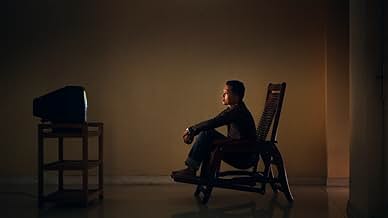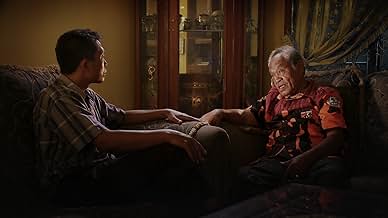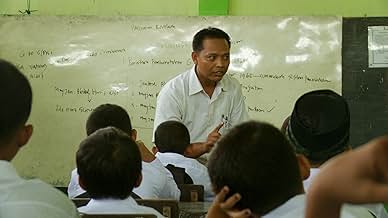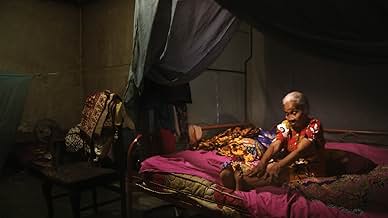अपनी भाषा में प्लॉट जोड़ेंA family that survived the genocide in Indonesia confronts the men who killed one of their brothers.A family that survived the genocide in Indonesia confronts the men who killed one of their brothers.A family that survived the genocide in Indonesia confronts the men who killed one of their brothers.
- 1 ऑस्कर के लिए नामांकित
- 48 जीत और कुल 45 नामांकन
- Self - former leader of death squad
- (आर्काइव फ़ूटेज)
- Self
- (वॉइस)
- (as Josh)
- Self - Sprecher
- (वॉइस)
- (as Achim Schülke)
- Self - reporter, NBC News
- (आर्काइव फ़ूटेज)
फ़ीचर्ड समीक्षाएं
I have never been able to write anything about its prequel, "The Act of Killing". I broke my rule of reviewing every movie I watch on here because I just wasn't up to the task. Watching that movie, and "The Look of Silence" to a slightly lesser extent, was like being dosed with heroin and hit with a sledgehammer. The usual "disturbing" movie, documentary or otherwise, has an impact that can be shaken off eventually. With "The Act of Killing", I never really felt it, but I knew it was there. It took something from me. The impact bled through into my day to day life. It wasn't just like a bad dream. It was real.
Here is "The Look of Silence". It gives a different side of the story that "Act of Killing" presented, through the son of survivors of the Indonesian genocide. He learns about the fate of his older brother, killed two years before his birth. Then he confronts some of the killers and their families, though these meetings don't go as you might expect, especially for the son, Adi.
This movie really should be watched alongside "The Act of Killing". Whereas "The Look of Silence" is no less horrible in its descriptions of actual murder, I have a feeling that it is the goodness of Adi and his family you will remember.
What I got out of this documentary was that many of the killers didn't know what a communist was, let alone think they were people. They were spun lies about the communists and many took joy in killing them. One of the most eye opening documentaries I've seen, amongst one of the most sadistic and terrible mass killings in history.
His second film, "The Look of Silence", coupled with his "The Act of Killing" has created a sea- change in the Indonesian truth, justice and reconciliation movement. Forcing new laws to be written and putting the government in a defensive position against the nation's media.
But Oppenheimer is more than an activist. He's an artist. His films are contemplative, playful and quietly confrontational. His visual attack is succinct, his marriage of form and theme is flawless and his moral intent is thunderous.
Where "Act of Killing" was concerned with a larger study of post-massacre Indonesia, "Look of Silence" chooses a more intimate landscape. Geographically, emotionally and cinematically it is regional. Concerned with a single killing, the men who did it – directly and indirectly - the family it affected and the small village that has lived with questions about other killings like it for fifty years. Where "Act of Killing" lived in absurdist grand cinema, "Look of Silence" exists in tight close-ups of the perpetrators, survivors and truth-seekers. More than anything, more than words, their faces tell the story. So much happens behind the eyes, around the corners of the mouth, in unspoken glances. The horror, doubt, guilt and seemingly impossible reconciliation stirs below the surface. For all the cinematic flex of "Act of Killing", this contained take on the same material, seems more haunted and human.
The star of the film, Adi the eyewear peddler, pursues this mission with intelligence and courage. We meet his family. His happy playful daughter, his thoughtful son, his cautious loving wife, his ageless mother (probably the most engaging character captured on film this year), his wisp of an ancient father, and his memory of a murdered brother, looming over everything. From them he finds the courage to question murderer after murderer face-to-face. The combination of his profession as an optometrist with his quest to seek truth would seem heavy-handed if it were fiction, but nothing here is inauthentic. In showing all of Adi's family, from the fresh and young, to the spent and dying, we see the full arc of life.
Lastly, the film makes a glancing but firm indictment against the American anti-Communist fervor that fed into - and the American corporations that profited from - these killings. It gives strong evidence that the Cold War, the war of ideology and the murder of millions, allowed for, and was even fought for, Western corporate dominance in places like this. And here the grinding up of human beings for profit in this situation is undeniable. Oppenheimer wants to make sure no one involved gets off without having to face, if not their own role in the massacre of millions, then at the very least, their culture's.
And so it goes, the people (wives, mothers, daughters, sons, fathers, husbands), the silence, the haunted jungle hum that fills most of the auditory space in the film, the great and overwhelming significance of it all everything pools together to show us something words alone can't manage. Something about how a horror can be so great that its impact can loom over generations. About living with debilitating fear of those who have claimed power over you through violence. About the most nightmarish tendencies in humanity, and our courageous capacity to overcome the worst of ourselves. About just how difficult it is to look into the eyes of a killer and say, "I know what you did."
And more profoundly, more frighteningly "I know you."
Oppenheimer utilised this blood-curdling footage years later, by showing its profound horror to a middle-aged Indonesian man whose brother was an unfortunate victim of the national purge. Acknowledging the explicit nature of his country's past and yearning to learn more, he singlehandedly confronts the perpetrators who executed the killings with Oppenheimer documenting the anxiety-inducing conversations, under the pretence of an eye examination. Through the changing of lenses, this metaphorical dissimulation magnifies the retinas of "Adi's" brother's executors, allowing windows into their darkened souls to widen.
Predictably, much like with Oppenheimer's creatively profound companion piece 'The Act of Killing', these individuals expressed minimal remorse. Proud to serve their nation and glorify their political ideologies. However, the purpose of these bleak confrontations was not to agitate those that committed such atrocities, but to perpetuate a historic generational divide within Indonesia. The current generation educated with false truths to adhere to the current sociopolitical climate. "Communists gouged the eyes out of army generals", students are taught. Yet the truth couldn't be any further from that manipulative fabrication. Everyone seemingly forced into silence regarding the questioning of their own national history. Therefore, producing such an unflinching documentary that dares to question the morality and legitimacy behind one of the worst genocides in recent history, is of paramount importance. Not just to Indonesia, but every nation that endures tainted democracy. Inciting societies to educate themselves and not ignore the grave actions of their previous generation.
Oppenheimer challenges the boundaries of documentary filmmaking once again, crafting uncompromising perceptive enlightenment through one man. A man whom represented the nullified silence of those feared by their own government. A man whom fearlessly questioned the very individuals that shaped his current standard of living. Representing the suffering and fragility of an oppressed society. Understatedly profound, yet consistently unshakeable in nature. The inclusion of iridescent quietude, from expansive shots of village life to close-ups of metamorphosis, overemphasising the extinguished freedom of speech. Many of the confrontations delivering unwavering tyrannical sensibilities likening their ideologies to totalitarian repression, exhibiting minimal sorrow for the thousands they slaughtered. Conversations that rightly bury the words under the skin to those listening. Ranging from indirect threats such as "be careful, what you're doing may be deemed as communist behaviour" to Western influences including "America taught us how to hate communists". Undoubtedly disconcerting.
Reservations for the confrontation with "Adi's" uncle, whom was guarding "communists" before they were massacred, is the sole criticism this documentary obtains. Staged, exploitative and unnecessarily producing familial drama in a nation that is already fragmented and traumatised. Consequently Oppenheimer overstepped the line in that particular instance, despite "Adi's" insistence, creating an artificially uncomfortable atmosphere for the sake of drama.
However, whilst not creatively innovative as his former insight into the Indonesian Genocide, Oppenheimer's The Look of Silence unequivocally nullifies all emotive output, perhaps more so that his previous directorial efforts. It is unflinching. It is uncompromising. It is of paramount significance. We need boundary-testing documentaries like this to truly provide insight and to evoke human right activism. To microscopically magnify the actions of humanity's past and ensure they never happen again. "That's politics. Politics is the process of achieving your ideals", the former commander of civilian militia joyously states with a grimace. "In many ways...".
क्या आपको पता है
- ट्रिवियाAdi and his family moved thousands of kilometers away to the other side of the country, out from under the shadow of the perpetrators who are still powerful situation in North Sumatra.
- भाव
Himself, brother of murdered Ramli Rukun: Tell me about that madness.
Himself, former leader the village death squad: Some killed so many people who have gone mad. A man climbed a palm tree, every morning, to call for prayer. Killed too many people. There is only one way to avoid it. Drink the blood or go crazy. But if you drink blood, you can do anything.
Himself, brother of murdered Ramli Rukun: [Testing the eyeglasses] What do you think...
Himself, former leader the village death squad: Salty and sweet. The human blood.
Himself, brother of murdered Ramli Rukun: Pardon?
Himself, former leader the village death squad: Human blood is salty and sweet. I know from experience.
- कनेक्शनEdited into P.O.V.: The Look of Silence (2016)
- साउंडट्रैकLukisan Malam
music by E. Sambayon & lyrics by Sakti Alamsyah
performed by Sam Saimun
courtesy of Irama Records
टॉप पसंद
- How long is The Look of Silence?Alexa द्वारा संचालित
विवरण
- रिलीज़ की तारीख़
- कंट्री ऑफ़ ओरिजिन
- आधिकारिक साइटें
- भाषा
- इस रूप में भी जाना जाता है
- Sessizliğin Bakışı
- फ़िल्माने की जगहें
- उत्पादन कंपनियां
- IMDbPro पर और कंपनी क्रेडिट देखें
बॉक्स ऑफ़िस
- US और कनाडा में सकल
- $1,09,089
- US और कनाडा में पहले सप्ताह में कुल कमाई
- $6,616
- 19 जुल॰ 2015
- दुनिया भर में सकल
- $1,57,857
- चलने की अवधि1 घंटा 43 मिनट
- रंग



























